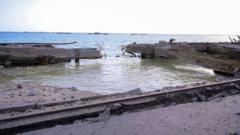With the clock ticking, significant diplomatic discussions between the United States and Iran are set to take place this weekend. These negotiations, initiated by President Trump, could determine the trajectory of America's relationship with Tehran and the broader implications for regional stability.
Iran Nuclear Negotiations: An Urgent Diplomatic Crossroad

Iran Nuclear Negotiations: An Urgent Diplomatic Crossroad
Amid escalating tensions, the U.S. and Iran head towards crucial talks in Oman to address nuclear ambitions.
The impending talks, scheduled for Saturday in Oman, come at a critical moment. Experts warn that failure to negotiate could lead to an unwanted crisis, as described by Sanam Vakil, director of the Middle East and North Africa Program at Chatham House. The stakes are notably high, as mutual distrust lingers over both nations' intentions.
President Trump has repeatedly articulated a preference for diplomacy over military action against Iran, despite his aggressive rhetoric earlier this week threatening unprecedented military response should negotiations fail. This position, articulated during a respected meeting with Israeli Prime Minister Benjamin Netanyahu, seems to align with the concerns echoed across the Arab world. Many regional states fear the ramifications of potential conflict, particularly given the ongoing violence in Gaza.
However, Trump's demands are seen as excessively steep. Calls for Iran to cease nuclear enrichment, surrender its enriched uranium stockpile, and dismantle its nuclear infrastructure are possible non-starters for Ayatollah Khamenei, Iran's supreme leader, who would view such conditions as humiliating.
The format of the forthcoming discussions remains uncertain. While Trump has indicated that these talks would be "direct,” Iranian officials suggest they may assume a more indirect approach via intermediaries. Nonetheless, both parties recognize the importance of establishing common ground, especially considering who represents both sides—U.S. special envoy Steve Witkoff and Iran's foreign minister, Abbas Araghchi.
With each moment that passes, the urgency surrounding Iran's nuclear program grows. The forthcoming discussions could either pave the way to de-escalation and reinstated trust or lead to an irreversible crisis. Observers will closely follow the developments from Oman in hopes of a peaceful resolution.
President Trump has repeatedly articulated a preference for diplomacy over military action against Iran, despite his aggressive rhetoric earlier this week threatening unprecedented military response should negotiations fail. This position, articulated during a respected meeting with Israeli Prime Minister Benjamin Netanyahu, seems to align with the concerns echoed across the Arab world. Many regional states fear the ramifications of potential conflict, particularly given the ongoing violence in Gaza.
However, Trump's demands are seen as excessively steep. Calls for Iran to cease nuclear enrichment, surrender its enriched uranium stockpile, and dismantle its nuclear infrastructure are possible non-starters for Ayatollah Khamenei, Iran's supreme leader, who would view such conditions as humiliating.
The format of the forthcoming discussions remains uncertain. While Trump has indicated that these talks would be "direct,” Iranian officials suggest they may assume a more indirect approach via intermediaries. Nonetheless, both parties recognize the importance of establishing common ground, especially considering who represents both sides—U.S. special envoy Steve Witkoff and Iran's foreign minister, Abbas Araghchi.
With each moment that passes, the urgency surrounding Iran's nuclear program grows. The forthcoming discussions could either pave the way to de-escalation and reinstated trust or lead to an irreversible crisis. Observers will closely follow the developments from Oman in hopes of a peaceful resolution.





















